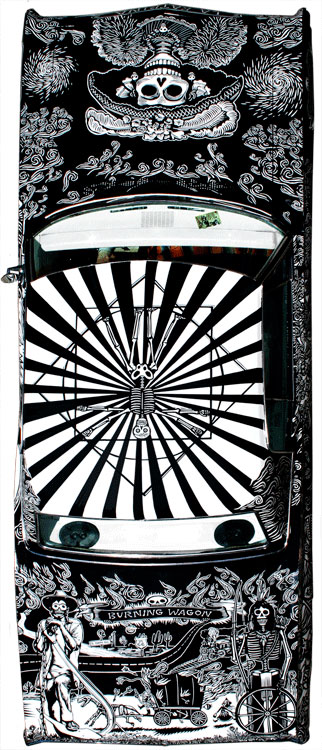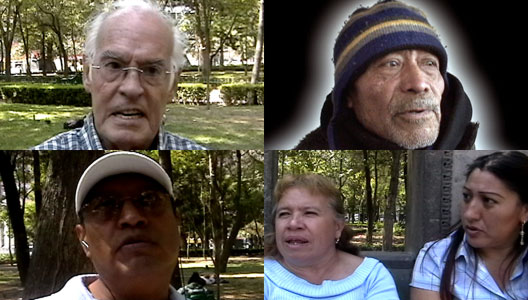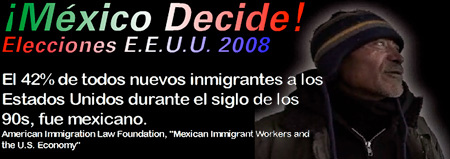Archive for the ‘critical_perspectives’ Category
VOTEMOS.US: Voting Cart 2008
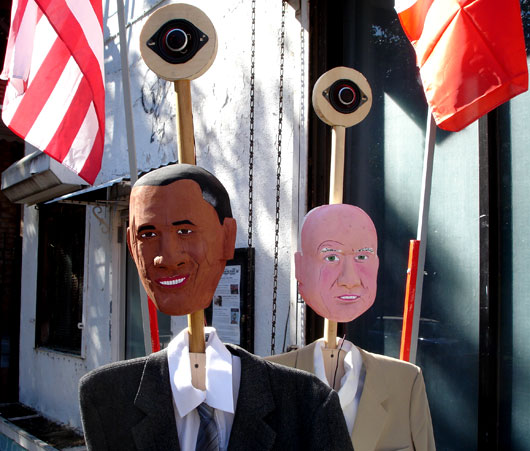
VOTEMOS.US an online initiative that questions how the 2008 United States Presidential Election would differ if all residents of the United States could vote, takes to the streets in the form of a voting cart by which participants may take the voice of either McCain or Obama as they make public a hypothetical vote for the 2008 U.S. Presidential Elections.
Catch the cart at Eyebeam during Open Studios on Saturday, October 18th, 3-6pm. Watch video of the cart traveling from Not an Alternative through Williamsburg to McCarren Park.
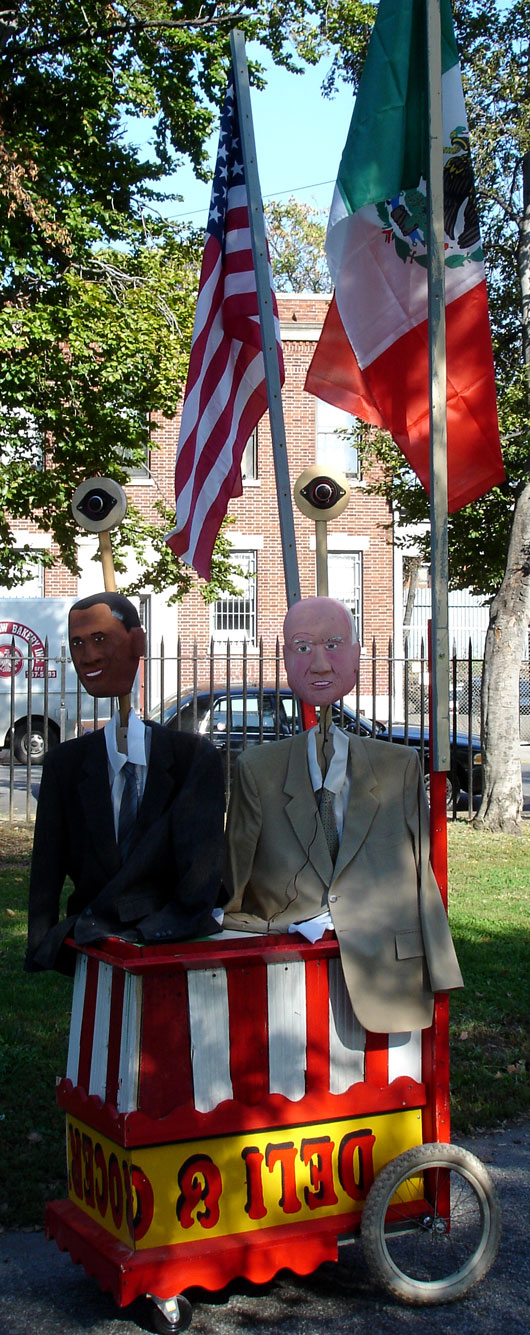
Special thanks to Jason Jones (cart fabrication), Charles Rittman (bust chiseling) and Not An Alternative for helping me realize the project.
Once You Step Outside the Reign of Aesthetic, the Work Is Only as Strong as the Subject
Robert King Wilkerson and Rigo 23 at the New Museum

A Portuguese voice, a Louisianan voice and a Brit voice
This afternoon I attended a free discussion at the New Museum that was part of Creative Time’s “Hey Hey Glossolalia: Exhibiting the Voice,” a series of free events throughout the month of May. The discussion was between Robert King Wilkerson, former Black Panther who spent 29 years in solitary confinement in the Louisiana State Prison aka Angola Prison, artist and activist Rigo 23 and Creative Time curator Mark Beasley. (Rigo 23 and Wilkerson have been working together for the past 7 years, apparently Rigo 23 is working on a documentary about Wilkerson.)
Robert King Wilkerson is the only member of the Angola 3 that has been liberated from prison. The other two Panther inmates, Albert Woodfox and Herman Wallace remain in solitary confinement, now 34 years, the longest that any human being has spent in closed-cell restriction that is 23 hours alone in a 6-foot-by-9-foot concrete box year after year after year.
The witness of a prison slaying that sent Wilkerson to a life-time jail sentence recanted his story which eventually lead to Wilkerson’s freedom as long as he wouldn’t sue for wrongful conviction. Now Wilkerson travels and speaks and people listen in amazement to a victim of a system that kept him in solitary confinement for 29 years and a total of 31 years in jail. If one stops to consider the psychological implications of spending half a lifetime alone in a small cell 23 hours of each day, it’s difficult to imagine how sanity may be retained.
Robert King Wilkerson is not only lucid, he’s a powerful speaker who triggers the imagination and hope. When asked how he kept his sanity, Wilkerson states that it was his innocence, that although he was in prison, he wasn’t going to allow prison get in him, his love to think, to dream, dream as a form of talking to himself. He also had lots of nightmares, but the dreams out-shined the nightmares.
In closed-cell restriction (ccr), prisoners are not allowed to speak, so talking to oneself in the cell and out loud to other prisoners during the one hour time out of the cell became a method of contestation and protest. “We weren’t going to let anyone from keep us from talking, no matter how many times they’d write us up. We’d tell them to write us up…” In talking about the power of voice, Wilkerson quotes his fellow Panther inmate Herman Wallace – “The deeper they bury me, the louder my voice becomes.”
When asked about the purpose of art and activism, Wilkerson states “thay you can use your hand, you can use your talent… to tell a story, a work of art can encompass a great deal.” His point being that art may be a very powerful means for change in our society. However when Rigo 23 was asked about his practice as an artist and activist, he stated that it’s “hard to not be overcome with a sense of futility, get overwhelmed with distractions and that he has left art to try to get something undone and from Robert to learn how to deal.” Rigo 23’s “One Tree” mural in San Francisco that points to a single tree next to the highway South of Market is amongst one of my favorite public works, so hopefully he’ll return to art in some way. Although when the curator who moderated the panel isn’t familiar with Act Up’s long time, powerful logo – the pink triangle over the phrase “Silence = Death”, one can’t help but question the point of activism in today’s Art World.
Documentary filmmaker, Jimmy O’Halligan is working on a film about the Angola 3; preview is available on youtube.
Stop the Raids and Deportations, May 1st Rally, NYC
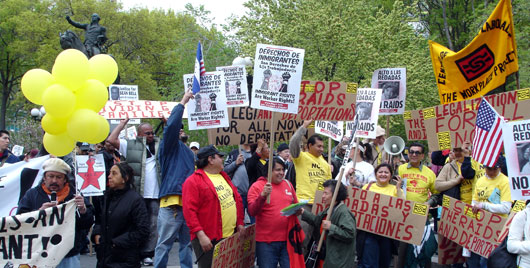
May Day was celebrated in strength yesterday at Union Square where several hundred people gathered to listen to speakers and music that questioned the deportations of laborers, demanded immigrant rights and celebrated multiculturalism. The gathering of several hundred grew to several thousand as the May Day activists marched from Union Square to City Hall.
At a time when all the news seems bleak – continued death of innocent people and soldiers in Iraq and Afghanistan, the increasing cost of groceries and gasoline, a growing popularity of McCain – the candidate who hopes to continue the Bush Administration’s failed agenda… it was reinvigorating to have a joyful gathering demanding citizen rights for those immigrants who help keep the city running.
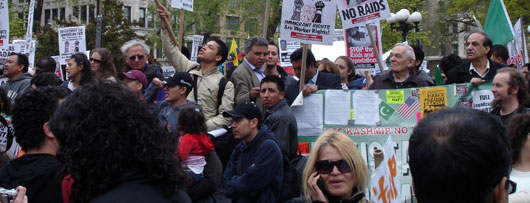
Every human color and age was present at the rally. It was an exciting mix of generations, languages and cultures enjoying the right to demonstrate in one of the greatest cities of the world. Amongst the points of protest were the raids of work places to deport laborers and markedly a protest against last week’s verdict regarding the killing of Sean Bell by 50 police bullets.
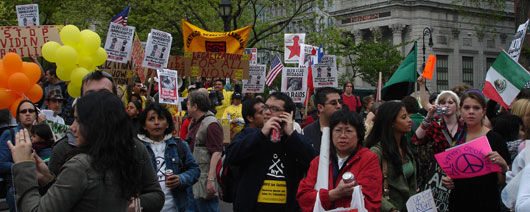
As the rally spilled from an enclosed area in Union Square onto Broadway, the number grew to the thousands, where tourists were taken by surprise.
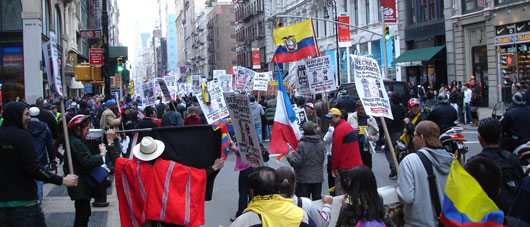
VOTEMOS.US Weekly Video Podcast Now Available
VOTEMOS.US the site that questions what the 2008 U.S. presidential elections would look like if all residents in the U.S. could vote will now feature weekly video interviews with U.S. immigrants and Mexico City residents concerning the presidential elections and general relations between the United States and Latin America.
Although VOTEMOS.US is a Spanish-language site, the videos have English language subtitles so that U.S. citizens may have an insight into the views of their Spanish speaking neighbors within the country as well as those south of the border. The weekly video interviews are available on the site, as a podcast or rss feed:
This week Argentine Jose Antonio Lazzari relaxing in the park Alameda Central located in the historical center of Mexico City states that he would not vote for Obama, Hillary or McCain and he questions who the leftist candidates are in the U.S… Jose Antonio goes on to point out that the United States is controlled by the transnational companies that are making a fortune in Iraq.
We had a lengthy conversation with Jose Antonio Lazzari, a theater actor and educator who runs a free school in Argentina. Sections of this conversation will be published over the next few weeks. Past interviews with NYC undocumented resident Raymundo are also available and all videos will be archived on the site.
Naomi Klein – short sighted and mistaken
After watching the video by Alfonso Curan inspired by Naomi Klein’s The Shock Doctrine: the Rise of Disaster Capitalism, I read “Latin America’s Shock Resistance” an article by Klein that briefly articulates some of the primary ideas behind the book. I have yet to get my hands on the book, but the article really angered me, so I had to write something in response, even if just a note to myself.
The article is a good read, but way too optimistic for me. For every positive change toward democratic socialism that the article sites, there are any number of privatizing and culturally negligent changes that are not mentioned, and are all too real to ignore. This for me takes a great deal out of Klein’s perspective. She’s right, Latin America has grown tired of the United States’ influence and power, changes are being made that counter 100+ year traditions such as School of the Americas and the banana republic diplomacy; these are changes that have been fermenting popularly since the 80s and for some groups much longer. But there are new transformations occurring based on transcapitalist models that are not being countered and not being fully understood, yet.
I know what is happening in Nicaragua first hand, so it’s the only place that she mentions that I can write about and she is entirely mistaken. Much of the beautiful, untouched beach front property on the Pacific has been purchased by foreign wealth, primarily US development contractors and small pieces by retirees. The once untouched rain forests of the country have been deforested. At the current rate of deforestation the majority of Nicaragua will be a desert in the very near future. On paper the rate of deforestation has lowered, but in reality a great deal of illegal deforestation continues, even under Sandinista watch – the money is too easy.
The entire cultural landscape has been transformed and continues to loose the identity it once had. In parallel with the communal organizations that she sites (primarily in South America), there are any number of private tourism companies established. In some cases tourism is managed by government, but it remains one of the largest private markets in Latin America. Nicaragua is trying to emulate Costa Rica’s tourism industry, an industry that overwhelms any cultural tradition, because culture is transformed into mere spectacle. I hate to use this sort of neoMarxist language, but I’ve watched it happen first hand and in real time. The transformation and loss of tradition is immediate. Perhaps tourism that caters to US tourist expectations is the new world bank, is that any better? It might be financially but not culturally.
Daniel Ortega is an ignorant example of the rise of the left in Latin America. Ortega was only elected as president because his party’s majority (the Sandinistas in the National Assembly) changed the constitution to lower the percentage of votes so that a run off between the two top candidates would not be required. The percentage was lowered to what Ortega had been at every previous elections in which he tried to retake the presidency – that’s every election since loosing to Violeta. I don’t recall the exact numbers, but for explanation, lets say that previously if no candidate received 40% of the vote, a run off would be necessary between the two top candidates, one of these always been Ortega and each time he lost. Now the winning percentage has been lowered to what he generally gets, about 35% and a run off will only occur if that winning percentage isn’t a clear 5% higher than the next best. In a 12 party race, with the Sandinista’s being the most powerful and wealth party, Ortega arranged the numbers to what he needed.
In order to win the Christian vote, the Sandinista lead National Assembly made all form of abortion illegal, this was in October of 2006. Within the first two weeks of the new law the first victim died, a young woman who could only live if she underwent an abortion or would die along with her unborn child. She did not have a choice and both died. I know this because my cousin, a doctor in Nicaragua who fights for women’s rights, spoke at the UN and sited this case while seeking the UN’s in repealing the abortion law.
And as for these financial programs that allow countries to not borrow from the world bank, one must still follow the money and see where it ends up. Last year presidents, Ortega and Chavez made a business agreement – the largest oil refinery in Latin America is to be built of the Atlantic coast of Nicaragua. In five years that refinery will not be nationalized, it will be owned by the Ortega family… And the blackouts in Nicaragua are worse than they have ever been, only now they are regularly scheduled, a small improvement.
Actually the more I consider the article the angrier I get! It’s entirely one-sided, it describes a forming utopia south of the U.S. border. Countries that prosper due to their new found independence and this simply isn’t true. She apparently has no clue of some of the backroom deals being made by these leaders that she makes into heroes. Her article makes me wonder if she’s traveled to Nicaragua and if so, where did she stay, who did she talk to and what cosmetic version of reality was she given. I’d like to believe in her perspective, but it’s incredibly short-sighted. It wouldn’t be so bad if I didn’t know that many people read her writing and believe it or consider it enlightening when there is so much missing that it is irresponsible..
The Shock Doctrine film short
“Only a crisis, real or perceived, produces real change” stated Milton Friedman, economist and vanguard of the free market and indeed the free market has prospered through human suffering. Friedman is a classic Conservative who believed that if one suffered, tough, one was dealt a poor lot, it is not upto society to fix the situation. According to Naomi Klein and Alfonso Cuaron there is hope for the disenfranchised even during the rule of the free market.
Hope is knowledge and communication (the basis of Enlightenment ideals – classical Liberalism) – “to resist shock is to know what is happening to you and why”. I’ve tried to believe this for a long time, but when I read of what is happening in our world and to consider the parallels of how it has happened before even within my liftime (and I’m not old), it’s difficult to believe in information as shock resistance. And hell, I’m a firm believer in informationalism, but one must have some level of entitlement, whether by birth, geographic location, migration, or availability of information. To say that information is resistance, assumes a great deal and only one that is entitled would be so careless to make that declaration. Perhaps the liberal revolution has lost to a powerful deity, one that was always with us, human nature – lust, gluttony, greed, sloth, wrath, envy, pride… the engines of Western civilization.
When a national immigrant policy is nonexistent…
Phoenix Police to Check Arrestees’ Immigrant Status. Following the killing of a police officer in Phoenix last fall, conservative legal group from DC pressures Mayor Phil Gordon of Phoenix to have the police become immigration enforcement.
VOTEMOS.US Mexico Decide
Thursday, January 3 is the Iowa Caucus and the 2008 U.S. presidential election year begins! With ongoing wars in Afghanistan and Iraq, a dropping dollar, increasing foreclosures of homes, fear of a recession and an incredibly negative international view of the United States, it is time for a change! And in a country built by immigrants who better to bring change than the country’s immigrant population, legal and illegal.
We live in a multi-millionare two party republic with a gigantic near slave-wage labor population that helps keep this country going, the United States should give all its hard working residents a vote! Votems.us – Mexico Decide does so by presenting a Spanish language portal to the US presidential elections and allowing users to register, vote and give their opinion on the US elections.
“In 2005 the percent of U.S. population that are migrants is 12.86%” the highest in the history of the country.” – Farhana Hossain, “Snapshot: Global Migration”, The New York Times
“The U.S. Social Security Administration has estimated that undocumented immigrants contribute approximately $8.5 billion in Social Security and Medicare funds each year.” — National Immigration Law Center, “Paying Their Way and Then Some”
“The U.S. Internal Revenue Service has determined that undocumented immigrants paid almost $50 billion in federal taxes from 1996 to 2003.” — National Immigration Law Center, “Paying Their Way and Then Some”
Votemos.us also features parts of an interview with Raymundo, a Mexican immigrant who left his home in Puebla in 1984 to come to the United States. He discusses the pointlessness of the border fence, that it is merely a political act that will not slow illegal immigration, after all most people pass through the border entries. He also recollects his own crossing of the border and the reality that although he has been living and working in the United States since 1984, he remains without his resident papers since he never had his birth certificate nor the means to acquire his residency because he doesn’t speak English or have money.
Votemos.us goes on to propose that Mexico have a vote in the U.S. elections. The United States has had a powerful influence in the Mexican national elections, now it’s time to turn that around. Between Mexico and the United States exists a constant circulation of people, product and capital so there is plenty of reason to give Mexico a say in who will be the next U.S. President! Mexico should be part of Super Tuesday, February 5th when California and New Mexico, two states that were once Mexican territories go to the caucus.
I originally planned this web site for Transitio, the video and new media festival in Mexico City that happened this past October. With the help of John Kuiphoff, votemos.us has a content management system that allows visitors to register with the site, vote and write an opinion on the elections; anyone may view other’s opinions and write their own reaction. The goal of the project is not only to point to the fact that within the US border lives a very active Mexican population that contributes to the national economy and is not allowed to vote, but also to present a repository of information and links to the Latin American community (within and beyond the U.S.) concerning the US national elections and to establish a public space to share their views.
Muertorider (deadrider), the beautifully macabre lowrider

Growing up in the Mission (San Francisco, CA), my dad loved cruising Mission street on Friday and Saturday evenings when it was packed with lowriders and girls running from car to car, guys trying to prove who had the superior car. My brother and I were too young to really appreciate it. I found the bouncing cars entertaining for the first 10 minutes, but as cars inched along we’d be stuck between 25th and 26th Streets for nearly an hour, way too long for me. However, when I see an incredible lowrider, it reminds me of that period and evokes a bit of nostalgia. (This was before the SF police cracked down on cruising, the lowriders moved to Daly City at that point, early 80s.) The artists John Jota Leaños and Artemio Rodriquez have teamed up to create a beautifully painted lowrider with motifs indicative of today’s reality – motifs that point to war, disaster and death.
“The fully functioning mobile art installation includes four animations from the New Media Opera, Imperial Silence that plays on the LCD movie screen in the car as well as radio programs from ¡Radio Muerto!, a specially curated radio dial with content from dozens of artists, writers, youth, and everyday Californians.” Go to John’s site to check out the full description: El Muertorider.
